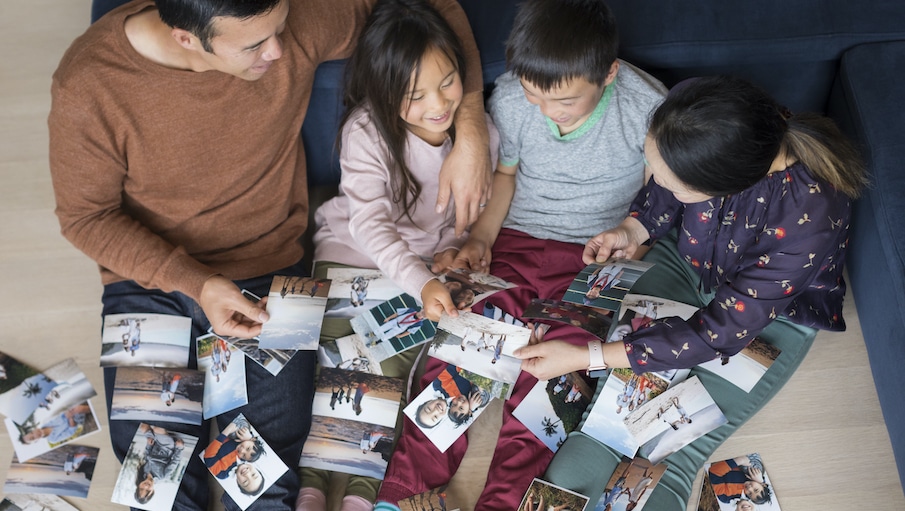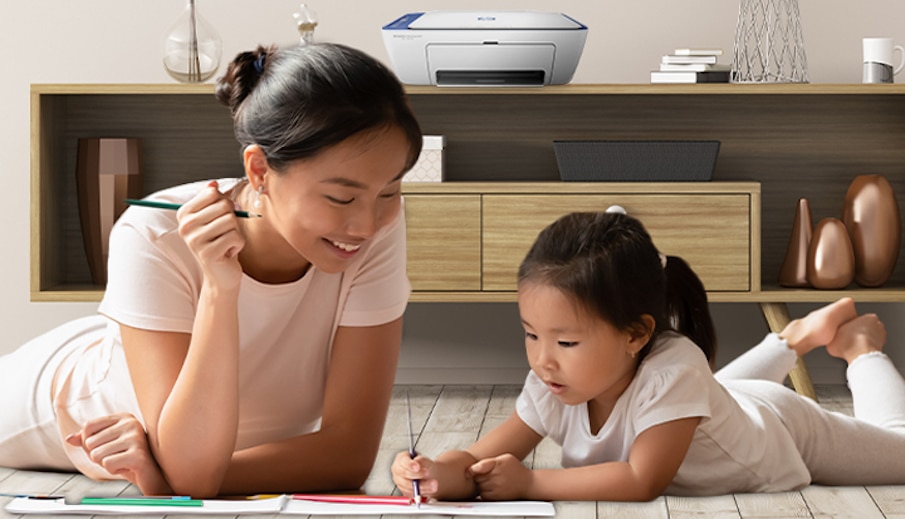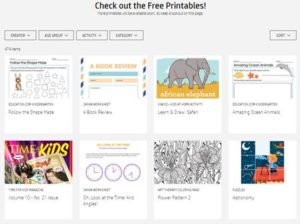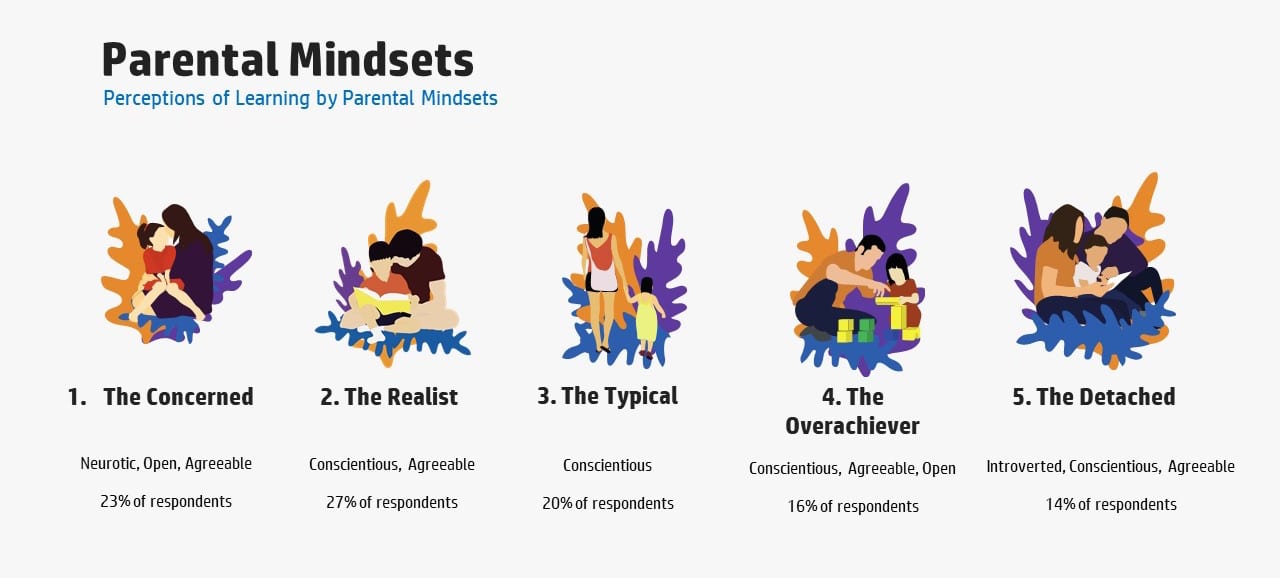Stressed about HBL and worried your kids have too much screen time? HP’s New Asian Learning Experience study sheds light on different parenting approaches.
Home-based learning has turned all of us into teachers, whether we like it or not! Somewhat presciently, HP Inc. in Singapore recently conducted a survey of Asian millennial parents to better understand their educational goals for their children and how they best learn. Topics like screen time, print vs. digital content, and rote learning vs. more open-minded methods were all covered. In total, the survey included feedback from 3,177 parents across Singapore, Malaysia, China, India, Indonesia, the Philippines and Thailand, with children between 5-10 years old and parents aged 25 to 42.
Quiz: What’s Your Educational Parenting Style?
1. Which single word best describes you?

How much have you enjoyed home-based learning?

What do you think is more effective, printed or digital learning materials?

What’s more important to you, interpersonal skills or academic performance?

What do you spend more on, family holidays or tuition?


Concerned parents are the most anxious about the impact of technology on their child’s learning, attention span and social skills. Yet they are also worried that their children are not being exposed to enough of it, whether at home or at school. More than any other parental mindset, they believe that children prefer using printed materials and learn better from them. They also place the highest value on traditional approaches to education, such as rote learning. Concerned parents spend the most time with their children on a wide range of learning activities and express the greatest intention to control their children’s learning content.
Want to find out more or read the full NALE report? Email HPSingaporeComm@edelman.com!

Realist parents are open-minded, pragmatic and want to give their children real-world exposure. They want their children to develop skills that can be used beyond the classroom and that will help them excel in life. This group views digital devices favorably, mainly because these devices can expose their children to other cultures and ideas. However, they still see the advantages of rote learning and spend large amounts on tuition. Realist parents enjoy helping their children learn mainly because it allows them to expose their children to new ideas and help them develop social skills.
Want to find out more or read the full NALE report? Email HPSingaporeComm@edelman.com!

Typical parents prioritize developing real-world skills, and for this reason, value experiential learning. They are ambivalent about digital and print learning approaches. For example, while they are among the least anxious about the impact of digital devices on their children, they also show the least appreciation of how these devices can help expose their children to other cultures and ideas.
Want to find out more or read the full NALE report? Email HPSingaporeComm@edelman.com!

Overachiever parents are often seen as “Tiger Parents,” but while controlling and disciplined, they are also imaginative and empathetic. Some 97% value experiential learning the most because it encourages creative and critical thinking. They believe that both print and digital have a place in education - digital devices expose children to other cultures and ideas, while print and physical learning fosters social interaction. The Overachiever worries that a lack of exposure to new technologies might cause their children to miss out on opportunities later in life. Overachiever parents enjoy helping their children learn so they can help them develop their interpersonal skills and bond with them. They value the greatest range of learning activities, especially reading and exposing their children to new ideas and technologies.
Want to find out more or read the full NALE report? Email HPSingaporeComm@edelman.com!

Detached parents spend the least amount of time learning with their children. But while they are the least engaged of the five parental mindsets, they are keen for their children to develop interpersonal and social skills, possibly because they tend to be introverts themselves. Detached fathers often admit that their wives are more involved in teaching their children. While Detached parents believe that children are easily distracted when reading on digital devices, they seem the least anxious about the role of technology in learning. For example, they are the least worried that their child may not be sufficiently exposed to digital platforms at school. They are also less concerned about how a lack of exposure to technology might cause their child to miss out on opportunities later in life.
Want to find out more or read the full NALE report? Email HPSingaporeComm@edelman.com!
Share your Results:
Asking the question How does your child learn best?, the survey teased out some super interesting data on the eternal screen time debate. For instance, it turns out children are actually more engaged and less distracted when using digital learning tools like an app, game or tablet. They actually smiled more and stayed engaged for up to 15% longer as compared to similar activities with printed materials (they also required far fewer prompts to “sit still and stop fidgeting!” – good to know that’s not just a constant refrain in our house!).

On the other hand, the study found much higher rates of parent-child interaction (and bonding) with print-based activities rather than digital devices. Parents were, unsurprisingly, more involved in actively teaching their children rather than simply observing. Children were also more responsive to their parents’ instructions and questions compared to with digital activities. Print-based learning was particularly effective when it came to learning and writing new words for older kids (aged 8-10), who performed 25% better on a Japanese character-writing exercise than the digital-only and digital + print groups.
HP also delved into parents’ own attitudes. For instance, while the survey found that all parents across countries value experiential learning over rote memorisation, 68% of Asian parents use rote-based learning methods, even though 47% value open-mindedness (not that they’re mutually exclusive). Parents also shed light on their varying levels of involvement in helping their children learn and their hopes and fears for their children’s future.
Analysis of the survey responses revealed five main parental “mindsets” in the region:

What’s your approach to your child’s learning? Do you think it’s changed during the Circuit Breaker period, or only become more evident? Take our quiz to find out more!
No matter what type of parent you are, we know you’re doing your best! Whether you prefer digital or print learning, HP can help you support your child’s educational journey with Print, Play & Learn, a free online resource with fun activities for kids ages 2 to 12. It’s got everything from craftwork and colouring projects to connect-the-dots puzzles and mazes. Whether you need to buy yourself some quiet time to get work done, or you’re looking for a fun bonding activity with your kiddo, HP has got you covered!
Want to find out more or read the full NALE report? Email HPSingaporeComm@edelman.com!
The post What’s Your Parenting Education Style? Take Our Quiz to Find Out! appeared first on Sassy Mama.